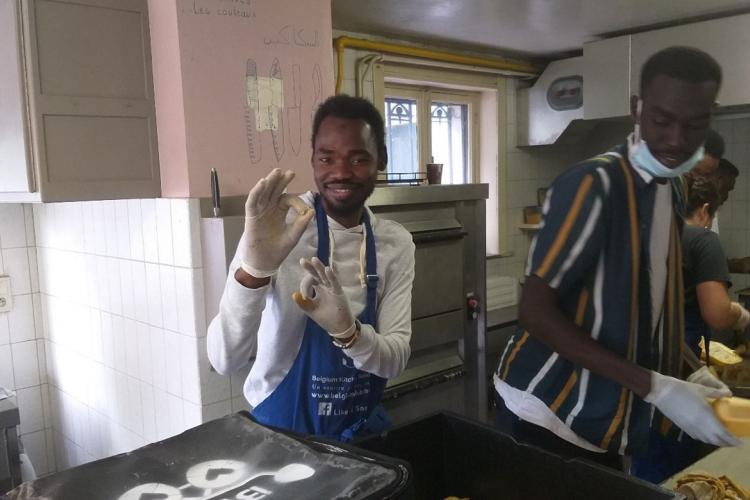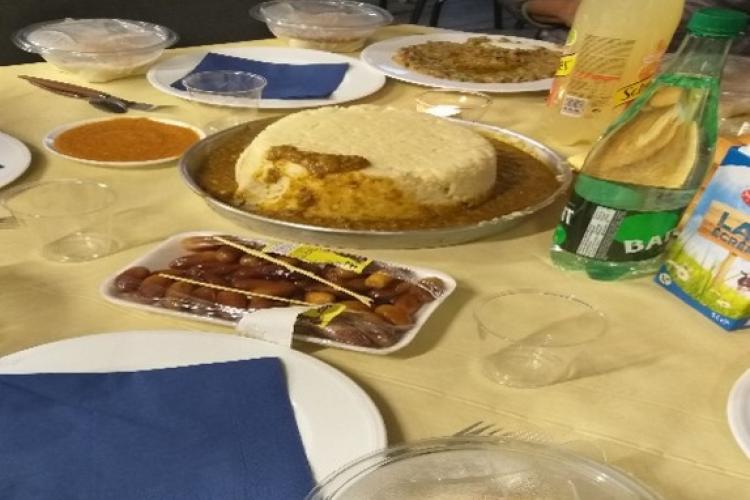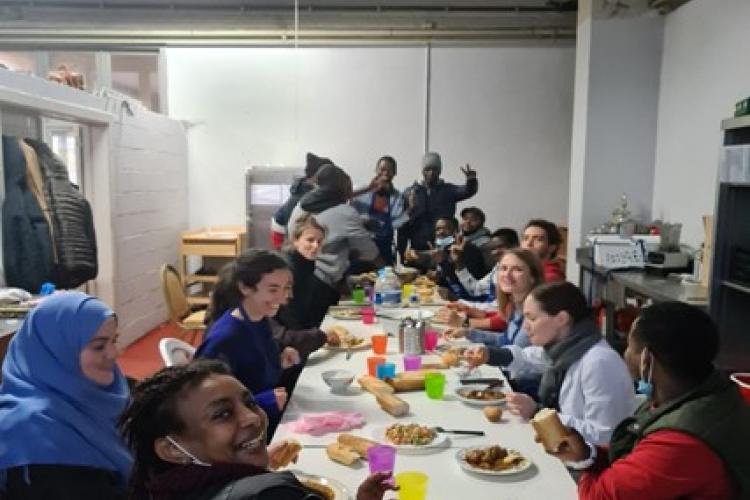Sudanese Migrants Countering ‘Everyday Violence’ In Brussels: Together We Are Even More Resilient
Posted:
Time to read:
Guest blog by Dalal Rajab. Dalal is a co-founder and coordinator of the Sudan Action Group, a Brussels-based diaspora organisation, and moreover holds a Master's degree in Governance and Development from the University of Antwerp. In this blog, Dalal reflects on the various ways in which the Sudanese-led project ‘Together we are even more resilient’, supported by the VGC (Vlaamse Gemeenschapscommissie: the Dutch-speaking government in Brussels), has countered the effects of ‘everyday violence’ through self-empowerment and by building bridges across society. This is the third post in Border Criminologies themed series on'Everyday Violence and Resistance in Europe’s ‘Migration Management’ During the Covid-19 Pandemic', organised by Marta Welander and Dr Susanne Jaspars.
The current situation for many Sudanese migrants (asylum seekers and undocumented people, including migrants in transit) in Belgium is extreme. The ‘everyday violence’, in Brussels in particular, is generated through the denial of basic needs, uncertainty over one’s residence status, hampered mobility of those seeking to reach the UK, police violence, discrimination, exploitation in the unregulated job market, and so on. In response to this, Sudanese migrants have come together to help increase the resilience of fellow migrants in Brussels during the Covid-19 period. As such, the everyday violence and associated challenges have been met by building on Sudanese values, which draw upon a cultural and religious background and are based on collective thinking and actions rather than individual ones. For instance, this entails confronting difficulties with resilience, acting on solidarity, generosity, and respect for elders, as well as helping disadvantaged people. This has greatly contributed to re-build the trust between Sudanese migrants and strengthen the sense of identity and their self-esteem.
Responding to the effects of ‘everyday violence’
The extremely bleak situation experienced by many migrants in Brussels has a detrimental effect on their mental health, causing depression, psychological disorders and self-isolation which in some cases have led to drug and alcohol addiction. Covid-19-related factors such as social and self-isolation have complicated their daily lives enormously.
To work against the consequences of social, self-isolation and the loneliness of Sudanese migrants during the Covid-19 period, the Sudanese-led project ‘Together we are even more resilient’ has enabled people to be more resilient and prepared to confront daily hardships. On the one hand, the project aimed to bring together and stimulate the human connection between Sudanese migrants themselves as they live in different settings: asylum-seekers centres, squats, citizens-municipalities shelter initiatives, hotels, hosted by families and friends. On the other hand, a major focus was to link people with their surroundings in Brussels, namely, the voluntary workers of the Belgium Kitchen and other Brussels-based social organisations.

Generosity, hospitality and solidarity
The project activities have been implemented by and for Sudanese migrants, supported by Sudan Action Group volunteers in close collaboration with Belgium Kitchen volunteers. For instance, Sudanese migrants came together for six months with volunteers from Belgium Kitchen to cook Sudanese and international food specialities to be distributed by Red-Cross Belgium to homeless people in Brussels. Building on Sudanese values such as generosity, hospitality and solidarity has proven to be a rewarding approach to bring Sudanese migrants together, fostering their sense of identity. The success of this approach was confirmed by a project member who said: ‘by making food for homeless people, even if I have no income, I feel myself useful and proud as Sudanese.’
Also taking the responsibility to make food for 450 homeless people every Saturday morning, gave a sense of purpose and solidarity with other vulnerable people. According to many participants, it also fostered a sense of self-worth which is a big part of resilience. As the project developed, an environment based on friendliness and trust was created. This in turn helped to lay a foundation for solidarity and other actions between the participants which also deepened the discussions on different topics and opened fresh perspectives for future initiatives.
A good example of this solidarity in action was making charity in the form of a hot meal to be offered to people in need in case of the death of a relative. This is a religious concept deeply rooted in Sudanese culture. By doing so, a number of Sudanese migrants managed to get over their personal grief at losing family members in Sudan during Covid-19 period. Additionally, some people began to discover their talents and skills in cooking, which encouraged them to take concrete steps towards professional training in the catering sector.

Breaking isolation and countering psychological harm:
Sharing lunch together with volunteers from many different backgrounds who form the Belgium Kitchen was a great way to break isolation and led to interesting dialogue and engagement with non-Sudanese. Having the courage and the will to speak out over specific difficulties in their daily lives (e.g. police violence, complicated asylum procedures, Covid-19 related aspects, cultural differences, etc.) was a step forward in surmounting the psychological barriers to expressing themselves openly and freely with others. Spontaneously, this process played an active role in raising awareness amongst the Brussels volunteers over many aspects of daily hardship of migrants in Belgium.
The challenge of communication had been marked by almost all Sudanese migrants as the main factor behind their isolation. More specifically, the ability to express themselves in other languages was a key issue. In the Brussels-multilingualism context, where Dutch, French, English are widely spoken, many Sudanese migrants said they felt confused and frustrated when attempting to communicate. While the majority of Sudanese migrants speak Sudanese Arabic dialect (plus their own local languages), Belgium Kitchen volunteers have quite different levels either in Moroccan Arabic dialect, French, Dutch, or English languages. Therefore, communication between them and other volunteers was a challenge. To ensure a functioning level of fluidity in discussions, a flexible multilingual atmosphere of four spoken languages was created. This innovative system was key in turning the frustration of Sudanese migrants over the language barrier into a positive attitude of engaging gradually in discussions with other volunteers. This choice consciously prioritized the ultimate goal of the project, the breaking of isolation by encouraging the need to express oneself over speaking the languages correctly.
Enabling communication to address integration and mental health:
The highlighted language barrier had been structurally addressed by organising Dutch classes and educational trips led by a volunteer professional language teacher. Remarkably, as the project evolved, the Sudanese involved felt an increasing sense of self-trust, were able to speak with confidence and engaged in deep discussion that manifested in an improved communication level between them and other volunteers. Furthermore, learning these language skills enhanced the integration path for some migrants by opening up chances for jobs and professional training.
Despite the difficulties and trauma experienced by most Sudanese migrants and the suffering endured from leaving home throughout the route to Libya, crossing the Mediterranean, and Europe, they have a common attitude of not discussing it. Organising roundtable group discussions exclusively for Sudanese migrants was useful was to explore reasons for this and other issues. Language obstacles, growing up in a patriarchal community, psychological aspects (e.g. trauma due to violence linked to displacement, conflict, hard migration routes, hostile environment against migrants in Europe, etc.) were all highlighted in roundtable discussions. Keeping silent was seen a shared coping mechanism.
At the forefront of these discussions were the personal experiences of Sudanese transit migrants with police physical and verbal violence. Describing police violence as ‘shocking and humiliating’, Sudanese believed languages obstacles, fears of deportation, lack of awareness about their rights as well as ignorance on the limits of police power make them more vulnerable. Throughout the project activities, Sudan Action Group (SAG) has been tackling this issue by raising awareness in small groups with a further plan to translate law-related documents into Arabic.
In the same way, SAG now runs a series of successful roundtable group discussions over other themes, for example of discrimination in Sudan and Europe where many of them managed to some extent to speak about their emotions frankly. Eventually, a secure and open atmosphere was gradually established, paving the way to make past and current suffering open for discussion. Sympathising with each other has facilitated strong and mutual feelings of resilience as well as an ability to cope with stress and functioning in society more productive. One individual expressed this point directly, saying: ‘What doesn’t kill us may make us stronger and bring us together as Sudanese migrants’.
Providing opportunities for individual consultation in Sudanese Arabic, aiming to orient awareness towards relevant social organisations in Brussels contributed considerably in linking migrants with services and professionals. Over time this significantly helped to break feelings of isolation. As a result, migrants are increasingly building trust in these organisations as important sources of information rather than depending exclusively on their own networks. Equally important, developing access to reliable information on questions of crucial aspects related to asylum law and procedures enhanced their decision-making ability and broadened future perspectives.

Conclusions: How resilient communities are better equipped to counter everyday violence
The efforts of Sudanese migrants to help break the isolation of fellow Sudanese migrants trapped in cycles of everyday violence, has contributed in different ways, by considering the situation and context that migrants live in; addressing the root causes of isolation, and developing ways to address these issues concretely and structurally. There is still much more that can be done, including a pressing need to have an approach that can support some migrants psychologically and to convince those with deep trauma to be referred to a medical specialist.
Empowering Sudanese migrants based on their homeland values and building trust between Sudanese migrants themselves and others are major elements to strengthen their resilience, sense of identity and their self-esteem. These initiatives have already shown great value and can continue further, building on successes and surmounting the challenges and the potentially detrimental effects of the everyday violence experienced by migrants in Brussels.
Any comments about this post? Get in touch with us! Send us an email, or post a comment here or on Facebook. You can also tweet us.
__________
How to cite this blog post (Harvard style)
Rajab, D. (2022) Sudanese Migrants Countering ‘Everyday Violence’ In Brussels: Together We Are Even More Resilient. Available at: https://www.law.ox.ac.uk/research-subject-groups/centre-criminology/centreborder-criminologies/blog/2022/02/ [date]
Share:








